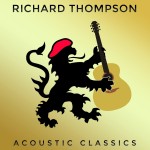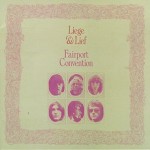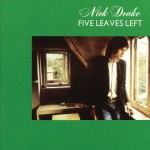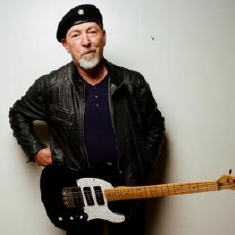There aren’t many musicians who, from the 1960’s to the present day, have consistently released first-rate material that’s always worth a listen. One of the few who belongs in this category is guitarist/singer/songwriter Richard Thompson.
Thompson got his start with the British folk-rock pioneers Fairport Convention, playing on their early albums including the 1969 landmarks What We Did on Our Holidays for which he wrote “Meet on the Ledge”, Unhalfbricking for which he wrote the lead track “Genesis Hall”, and Liege & Lief for which he wrote “Fairwell, Fairwell” and co-wrote “Crazy Man Michael”.
Thompson went on to record a series of albums with his then-wife Linda, with notable releases including 1974’s I Want to See the Bright Lights Tonight and 1982’s Shoot Out the Lights. After the latter, he has primarily pursued a solo career, with releases including 1991’s Rumor and Sigh with fan favorite “1952 Vincent Black Lightning” and, most recently, 2013’s Electric. And coming soon is an album Acoustic Classics, which revisits songs spanning his entire career in an acoustic format.
This interview was for a preview article for Thompson’s concert at the Lobero Theatre in Santa Barbara on 7/9/14. It was done by email, with answers received on 6/10/14. (Pamela Littky photo)
Jeff Moehlis: What can we look forward to at your upcoming concert in Santa Barbara?
Richard Thompson: I’ll play an acoustic set, and then we’ll play a band set – hopefully something for all tastes! The material will range from the 60’s up to right now, covering Fairport Convention, Richard and Linda, and solo eras.
JM: Can you tell us a bit about your soon-to-be-released album Acoustic Classics?

RT: This was conceived to be something to sell at acoustic shows. I don’t really have anything on the merchandise table that is representative of a solo show, so I went in the studio and revisited some of the more popular songs I play live.
JM: Were there any songs that you particularly wanted to revisit, perhaps because the original recording didn’t feel right to you, or because the meaning of the song has changed substantially for you over the years?
RT: In most cases, these are acoustic versions of songs that were originally recorded electric, and there have never been acoustic studio versions, just some live recordings, where I wasn’t always satisfied with the sound or the performance. Also, some of these songs are 45 years old – I sing them and feel about them differently, and it’s nice to capture the evolution.
JM: One of our locals, and a big supporter of your music, is Hale Milgrim. Can you tell us about your history with him?
RT: Hale was President of Capitol Records when I was signed there. As far as I could see, his tenure was transformative – everyone in the company loved him, top to bottom, he communicated with everyone, it became a joyful place. Perhaps he didn’t play the corporate game well enough, or he might still be there. He and I have remained friends over the years. If I need advice on music, he’s someone I would think to consult.

JM: One of my all-time favorite albums is Fairport Convention’s Liege & Lief. What are your reflections on that particular album?
RT: We wanted to shift away from American roots in our music, and play a style that was more true to our own culture in the UK. So we updated and electrified the traditional music of Britain. This was revolutionary at the time, and this album had a wide-ranging influence.
JM: Can you describe the Sandy Denny that you knew?
RT: Super-talented, wonderful singer – one of the absolute greatest talents to emerge from Britain. Sandy could be a pain, but she was mostly a joy, big-hearted, larger than life, and her music affected everyone who came in contact with her.

JM: It’s been great to see the growing interest in Nick Drake’s music over the years. What were the recording sessions with him like?
RT: I only ever recorded overdubs on Nick’s work. This just seemed to be the best way to get the most from his performances. He cut most of the string dates live. I found his music beautiful and intriguing, and I’m glad people are finally getting to hear it.
JM: What advice would you give to an aspiring musician?
RT: This is a tough time to be getting into music. Your intellectal property isn.t worth shit. Your only source of income is live shows and T-shirt sales. If you have to do it, you have to do it, but you’re better off having a day job.
JM: Do you want to set the record straight on anything about your career?
RT: I am not the Thompson Twins. Not even one of them.
JM: What are your plans, musical or otherwise, for the near future?
RT: A band EP coming out in Fall, another band album for next Spring, a song cycle about The Great War for 2016 – that’s most of it.
JM: Where are you responding from?
RT: Los Angeles


Discussion
No comments for “Interview: Richard Thompson”